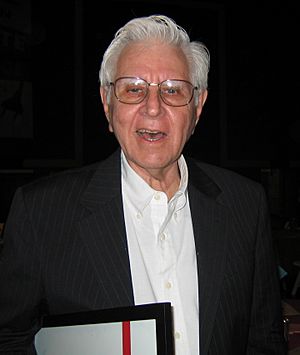Rodolfo Acuña facts for kids
Rodolfo "Rudy" Francisco Acuña (born May 18, 1932) is an American historian and a retired professor. He taught at California State Northridge. He is also a very important expert in Chicano studies. He wrote a famous book in 1972 called Occupied America: A History of Chicanos. This book is a key text for understanding Mexican American history.
Contents
Early Life and Education
Rodolfo Acuña was born in Los Angeles, California, in 1932. His mother, Alicia Elías, was from Sonora, Mexico. His father was from Cocula, Jalisco.
Acuña went to Los Angeles State College. This school is now called California State University, Los Angeles. He earned his first two degrees there. Later, he received his highest degree, a Ph.D., in history. He earned this degree from the University of Southern California (USC).
A Career in Teaching and History
Acuña started his teaching career in 1958. He taught at San Fernando Junior High. He then moved to Cleveland High School. There, he taught social studies until 1965. After that, he got a permanent teaching job at Los Angeles Pierce College.
While studying for his Ph.D., he also taught at an adult high school. During this time, he was active in groups like the Latin American Civic Association. He also worked with the Mexican American Political Association. In 1969, he helped start the Chicano/a Studies department at California State University, Northridge. He became the first leader of this department and taught there.
In 1989, Acuña helped create the Labor/Community Strategy Center. This group works to protect civil rights. Two years later, he visited El Salvador. He went as a reporter for the Texas Observer magazine. He wanted to learn about the country's presidential elections. He also wanted to see how historians understood the past.
Standing Up for Fairness
In 1990, Acuña wanted to become a senior professor. This was in the Chicano Studies Department at the University of California, Santa Barbara (UCSB). The department had asked him to apply. He was the only person they suggested for the job. However, a group of professors decided not to hire him.
In 1992, Acuña took UCSB to court. He said they had treated him unfairly. A jury later agreed that he had been treated unfairly because of his age. The judge, Audrey Collins, did not make the university hire him. Instead, she gave him $325,000. Acuña said he and his wife would use this money. They wanted to help other people who faced unfair treatment at work in colleges. The For Chicana Chicano Studies Foundation now gives scholarships. They give about $7,500 each year to students.
Rodolfo Acuña's Impact
Rodolfo Acuña's important papers and writings are kept at California State Northridge. They are in the Special Collections and Archives section of the Library. These papers help people learn about his work.
Awards and Recognitions
- CHOICE Magazine gave him an Outstanding Academic Title award. This was for his book Corridors of Migration: The Odyssey of Mexican Laborers, 1600–1933 in 2009.
- He received a Lifetime Achievement Award from the National Hispanic Institute in 2008.
- The Community Coalition South Central Los Angeles gave him an Activist/Scholar Award in 2008.
- He received The Labor/Community Strategy Center Award in May 2007.
- The Center for the Study of Political Graphics (CSPG) gave him the Historian of the Lions Award in 2007.
- He received the National Hispanic Hero Award in 2006. This was from the United States Hispanic Leadership Institute.
- LA Weekly featured him as one of 100 important people in Los Angeles in 2006.
- California State Northridge held a special meeting about his work in May 2005.
- He was chosen as one of the "100 Most Influential Educators of the 20th Century." This was by Black Issues In Higher Education.
- He won the Gustavus Myers Award for an Outstanding Book on Race Relations in North America.
- The National Association of Chicana and Chicano Studies gave him a Distinguished Scholar Award.
- The University of Guadalajara honored him. They recognized him as an outstanding expert in U.S.-Mexico Studies.
- He received the Emil Freed Award for Community Service.
- The Liberty Hill Foundation gave him a Founder's Award for Community Service.
- He received an American Council of Learned Societies Award.
- He was given a Rockefeller Humanities Fellowship.
 | May Edward Chinn |
 | Rebecca Cole |
 | Alexa Canady |
 | Dorothy Lavinia Brown |


